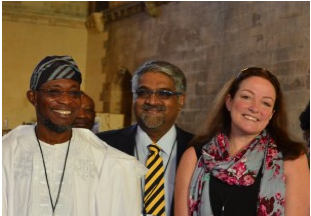
The Evolution Of School Feeding
 In 2013, up to $75billion dollars was invested by the governments of 169 countries into school feeding programmes. It is estimated that for every $1 spent feeding school children, $3 are generated for the local economy. Last week, a special meeting of global leaders in school feeding met in the UK parliament to discuss how governments are increasingly using school feeding programmes as a means to both improve educational outcomes and at the same time improve agricultural economies.
In 2013, up to $75billion dollars was invested by the governments of 169 countries into school feeding programmes. It is estimated that for every $1 spent feeding school children, $3 are generated for the local economy. Last week, a special meeting of global leaders in school feeding met in the UK parliament to discuss how governments are increasingly using school feeding programmes as a means to both improve educational outcomes and at the same time improve agricultural economies.
Leading experts including the Governor of Osun State, Nigeria and representatives from Imperial College London, the World Bank, the World Food Programme and the African Union were speaking at an All Party Parliamentary Group on Agriculture & Food for Development meeting on the evolution of home grown school feeding (HGSF) programmes. HGSF refers to school feeding programmes which procure their food from local smallholder farmers thereby supporting local rather than foreign markets.
The impact that a successful HGSF programme can have was provided by key note speaker, H.E Rauf Aregebesola, Governor of Osun State in Nigeria who said that since the launch of his State’s school meals programme (known as O’Meals) which feeds over 250,000 children every school day, enrolment has increased by 24%. The O’Meals programme provides employment to over 3,000 women and purchases food from over 1000 local farmers.
The experiences of Osun State tallies with that of governments from across the globe, the World Bank’s Professor Donald Bundy noted that analysis from the influential book, ‘Rethinking School Feeding’ that he co-authored in 2009, had identified that countries were increasingly turning to school feeding programmes as a form of a social safety net for their poorest communities. In Europe, in response to the recent recession, countries such as Spain, Portugal, France and the UK, had implemented school feeding programmes as means to protect their most vulnerable members of society.
This growth in school meal coverage provides an opportunity for local agricultural economies, Professor Bundy said, “School feeding programmes provide a structured demand for agricultural produce and can, when implemented correctly, encourage wider economic development. Even crisis hit countries such as Cote D’Ivoire, Madagascar, Mali and Sudan are shifting to nationally run programmes which procure their food from local smallholder farmers.”
Speaking on behalf of the African Union’s New Partnership for Africa’s Development, Ms Boitshepo Giyose agreed, ‘We’re seeing more and more sub-Saharan Africa countries adopted HGSF but they still need support to achieve this, international partners have a vital role to play in promoting cost-effective and sustainable programmes.”
The meeting was co-hosted by the Partnership for Child Development (PCD) from Imperial College London who is working with governments to build the evidence base and provide technical assistance for the development of effective and sustainable HGSF feeding programme.
Speaking at the event, PCD’s Executive Director, Dr Lesley Drake said, ‘Research shows that when properly designed, HGSF programmes can act as a win-win for both school children and smallholder farmers alike.’
She continued, “For integrated school feeding programmes to succeed like they have in Osun, governments and development partners alike need to integrate HGSF into their policies, strategies and plans for agriculture and for education.


